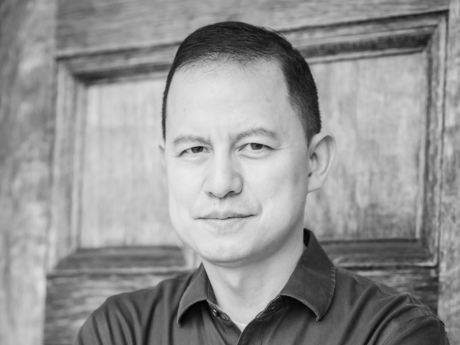Award Winners
Robert H. Winner Memorial Award - 2024
José Edmundo Ocampo Reyes

Photograph, Mueller Family, Philippines, ca. 1906-1907
Home can be found at the intersection of
before and if. Before the photograph was taken,
across the Pacific my great-grandfather
sailed with his fellow infantrymen
to battle the insurgents. Before that,
the enlistment, Chicago; before that
the Navy, three ships in twelve months.
He wears a dark tuxedo, its exact color
obscured by the absence of spectrum,
of memory. If he ever killed a Filipino,
I cannot prove it. If he carries
my grandmother, baby dressed in white,
it is because McKinley’s god’s imperative
pierced the evening’s silence, because
two Democrats switched their treaty vote.
If my dark-skinned great-grandmother, her hair
pompadoured, wears a white Maria Clara,
it is because there came a point when her desire
to take my great-grandfather’s name meant
forgetting he was an invader. If it matters
that my grand-uncle, barely taller
than the hand-carved table behind him,
wears a white sailor’s uniform, it is because
his father wore one a decade earlier
while he slept on a ship’s cathead,
while he stole items no one can identify,
while he fed on bread and water in the brig,
before he was dishonorably discharged.
If it matters that my great-grandfather’s right hand
rests like a bitter melon leaf on my grandmother’s belly,
it is because now will become before in forty years,
when she will give birth to my mother:
countless conditionals and subjunctives
converging in a watersmeet, rivers yet to converge.
This poem appears in RHINO.
Nathan McClain on José Edmundo Ocampo Reyes
In a 2018 interview with PBS NewsHour, poet Kevin Young remarked, “a good poem to me doesn’t just describe a feeling. It enacts it. It enacts an experience. And for the moment of the poem, you are. . .transformed and transported.” Simply put, and especially if I’m employing Young’s metric, the poems in “Distant Possessions” are quite good. Said somewhat differently, however, these poems—through their utilization of fixed or inherited form, found language, formal experimentation, such as erasure and collage, invention, ekphrasis, history and historical research—enact the nuance and complexity of a history rooted in colonialism and exploitation for the speaker who traces that history, its personal and public dimensions, and the silences that have attended such history: “If [Mueller, for instance] ever killed a Filipino, / I cannot prove it.” Furthermore, the poems enact a reclamation of a redacted or partial narrative—the “stole[n] items no one can identify”—in part, by deploying the pantoum—a specifically Malaysian form—to interrogate chapters of William Frederick Mueller’s life and fingerprint on the speaker’s own history and racial identity.
At the center of this fine selection of poems, rich and wonderfully musical, is an interrogation of value—from the Philippines as a U.S. territory in which “Americans cannot be grown,” the speaker’s own great-grandmother and broader lineage, to the “gift / of language” itself—that which was robbed from and which was imposed upon a people. Throughout the selection, this poet offers a range of approaches, strategies, and rhetorical stances that continually offer surprise and prompts this reader to keep turning the page. I highly anticipate this collection.
**
José Edmundo Ocampo Reyes was born and raised in the Philippines. He is the author of Present Values (Backbone Press, 2018), winner of the Jean Pedrick Chapbook Prize from the New England Poetry Club. His poems have appeared or are forthcoming in Bennington Review, Poetry Northwest, Memorious, Rattle, RHINO, and Laurel Review, and his work has been featured on The Slowdown podcast.
